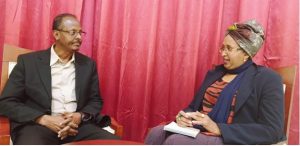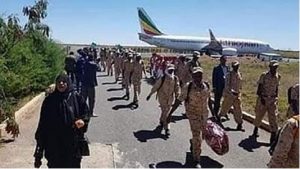By Lul Araweelo Kulmiye
Between December 13 and December 18, 2018, I spent some time in Ethiopia. I had the opportunity to go to Jigjiga, the capital of the Somali State, and meet with various government officials, including President Mustafa M. Omer. I met women activists, business people, and members of the civil society. I also visited Jail Ogaden, once a center of torture and human rights violations. Among the leaders I met was Ahmed-Yassin Sh. Ibrahim, the Ogaden National Liberation Front (ONLF)’s Secretary for Foreign Affairs. Here is the interview I conducted with him.

Question: The leaders and fighters of the ONLF are back in Jigjiga peacefully, and the organization has been removed from the list of terrorist groups. What has changed about the objectives and vision of the organization?
Ibrahim: In fact, this is not the first time that the ONLF has been in Jigjiga. This may be the first time for me personally, but the organization has always had a presence in the city even during the struggle for liberation. In 1991, the ONLF was part of the political changes that were taking place in Ethiopia. We won the state elections in 1993 and formed a local administration. In 1994, the Ethiopian government changed course and started treating us with hostility. It was at that time the armed struggle for liberation resumed. Our goal has been—and still is—the liberation of the Somali people so they can decide their own fate.
On October 21, 2018, the Ethiopian government and the ONLF signed a peace treaty in Asmara, Eritrea. The goal of the organization is the same, but the method has changed; we are now committed to attaining our goal peacefully and through dialogue.
Question: Does the ONLF want to be part of the Ethiopian government or does it seek to be an independent political party and stand for elections?
Ibrahim: The ONLF was founded for a specific purpose. It has responsibilities to fulfill and programs to implement and until all these are done, it will not stop. For 24 years, it has fought to accomplish its goal of liberation and it will continue to do so. Within the Asmara peace treaty, there are responsibilities for the Ethiopian government to shoulder, which entail abiding with the agreed-upon provisions of the treaty and respecting international law. As long as the government respects these provisions, the ONLF will be part of developing the country, and ensure its comprehensive program for the economy, politics, social issues, and
Ibrahim: The ONLF has a two-pronged approaches: one at the federal level with the Ethiopian government, dealing with the issue of the future of the region; the other is at the state level, dealing with the current situation in the DDS. The organization has formed two committees, one federal and the other state. The Somali people in the DDS have suffered tremendously while under occupation, and there are many problems that need to be tackled. The ONLF will work with the DDS and cooperate in areas such as security, the economy, social services, transportation, tele-communication, and overall development of the region.
Question: Regarding the federal level, there is a law prohibiting foreign passport holders to run for elections or hold office. Since many ONLF leaders have lived in the diaspora and hold foreign passports, how can that be reconciled with the current law?
Ibrahim: It was a law enacted by then Prime Minister Meles Zenawi in 2005 to prevent certain diaspora people from participating in the political process. In fact, it was a proclamation which was unconstitutional and discriminatory. It affects not only Somalis but also Oromos, Amhara, Sidama, and others. If this law is not repealed before the elections, the ONLF will find other ways to be a part of the process. In other words, we will be fine. It is important to know that the ONLF is not an organization for foreign passport holders; it has wide support among its people. The Ethiopian government officials we have talked to, including the Foreign Minister, are aware of the problems this law poses.
Question: The ONLF has been fighting for liberation for 24 years and now there is peace. What will happen to its fighters regarding the issue of adjusting to civilian life?
Ibrahim: We have a well-thought-out program for our returning members and our people, who have suffered repression, torture, loss of freedom, and lack of basic opportunities. We have an opportunity now to develop our land and attain our goals. There is a lot that can be accomplished through peaceful means. We have a comprehensive program, and we want to lead our people. The country needs recovery because many people have been traumatized and need time to heal. There is also a need for resources such as manpower, funds, and tireless effort. We call upon all who can help us with their knowledge, expertise, and material support to step forward. The ONLF is not a closed circle; it is open to all. Those who are not members now are welcome to join. We want one society, united with a common goal.
Question: The name “Ogadenia” for the region and the word “Ogaden” in your official name make some people believe that your organization is clan-based and has nothing to do with the Somali cause. How do you respond to this criticism?
Ibrahim: These people have the right to express their opinion, and I have the responsibility to set the record straight. We did not take the name of our organization because of tribal affinity or sentiment; instead, it was chosen for historical relevance. Decades ago, the British handed our land, which was then called ‘Ogaden” to Ethiopia. The treaty in which the territory was transferred specifically said “Ogaden” as were other documents and maps. Somalis affix signs on their livestock and if a camel is lost, one has to search for it by giving the attributes of the animal and its sign. The word “Ogaden” is like this sign for our territory and we want to get back what is ours.
There was a time when the territory was named “Western Somalia,” but that was confusing to many because it was not clear if one was talking about the western part of Somalia or Ogadenia. When the Somali people get their freedom, they can decide what name they want to choose, and that will be fine with the ONLF.
In 1993, the ONLF was the political party that came up with the name “The Somali State.” If we wanted then to name the region “Ogadenia,” we could have done it. Then, Abdi Iley (former president of the DDS) added “Ethiopia” to the name. Now, Iley’s addition has been excised. The ONLF is not a clannish entity, and I don’t think we could have survived for the last 24 years if we were such. The organization has been in existence for 35 years because it has national goals.
Question: What about those people who have grievances against the ONLF during the years of armed struggle?
Ibrahim: Most of the complaints and criticisms against the ONLF are made by its enemy who used armed soldiers against us. When these soldiers were killed in battle, accusations were made that the ONLF had killed Somalis from this clan or that clan. Of course, there were cases in which mistakes were made and innocent people were killed. The ONLF did pay compensations to these victims in specific cases, and other victims were promised compensation in the future when the organization will be financially able. We have judicial agencies to investigate legitimate grievances.

Question: How will the ONLF, which has operated during its armed struggle by relying on donations from its supporters, financially survive during a time of peace with much expectations to accomplish and limited resources?
Ibrahim: During our long struggle, we have always had a policy of self-reliance. There was a time the organization, then “Western Somalia” was funded by the Somali government. Realistically, when another entity funds you, even if it is your brother, there are strings attached; the funder wants something in return. The best thing is to be independent so that you are not beholden to anyone. For 24 years, Ethiopia has used all the resources at its disposal, such as military force, money, and intelligence warfare, to eradicate us, but instead we have succeeded in defeating the TPLF-led regime (Tigrayan People’s Liberation Front). We did that without the aid of any government or being armed with warplanes. We will depend on our people.
Question: You said you defeated the TPLF-led government, yet you are returning home facing daunting challenges. Some people might say the ONLF as an organization has been traumatized from all the years of armed struggle and it needs help. What do you say?
Ibrahim: The concept “traumatized” fighters returning home is western. Our fighters are returning home, and we are confident they will lead normal lives with no emotional scars. Regarding the issue of defeating the TPLF government, I will tell you a story that happened in 2012 in talks in Kenya with the then Ethiopian regime. These negotiations were facilitated by Kenya. Ethiopia was represented in these talks by a Defense Minister and two other officials, and I was a member of the ONLF delegation. In the first round of the talks, things went well, but during the second round, the Ethiopian officials became concerned that they were losing, and they started sabotaging the negotiations. The Defense Minister threatened that there would not be any place—not even a single tree—in the Horn of Africa for the ONLF to seek refuge. We responded by promising that we would take our struggle to Addis Ababa, the capital of Ethiopia.
Well, that is exactly what happened. With the collaboration of other ethnic groups in Ethiopia, we succeeded in toppling the TPLF government. Today, we are in jigjiga peacefully, and the leaders of the TPLF are being hunted down.
Question: Finally, what message do you want to send to the Somali people?
Ibrahim: I want to tell the Somali people in Ogadenia that our goal of liberation is the same, but the method has changed. We want to bring change through peaceful means. We want all Somalis to work together and be united through our shared nationality, not through tribalism. Somalis as people have the right to life, safety, security, development, and our fair share of resources in the current system of power-sharing among various ethnic groups. We are the third-largest nationality in number and the first one in land mass, yet the 70th one when it comes to resource-sharing. We need to get what is rightfully ours. We need to be united and forgive each other.
Lul Araweelo Kulmiye
Email: [email protected]
———
–![]() Watch the interview in Somali on YouTube
Watch the interview in Somali on YouTube
We welcome the submission of all articles for possible publication on WardheerNews.com. WardheerNews will only consider articles sent exclusively. Please email your article today . Opinions expressed in this article are those of the author and do not necessarily reflect the views of WardheerNews.
WardheerNew’s tolerance platform is engaging with diversity of opinion, political ideology and self-expression. Tolerance is a necessary ingredient for creativity and civility.Tolerance fuels tenacity and audacity.
WardheerNews waxay tixgelin gaara siinaysaa maqaaladaha sida gaarka ah loogu soo diro ee aan lagu daabicin goobo kale. Maqaalkani wuxuu ka turjumayaa aragtida Qoraaga loomana fasiran karo tan WardheerNews.
Copyright © 2024 WardheerNews, All rights reserved


